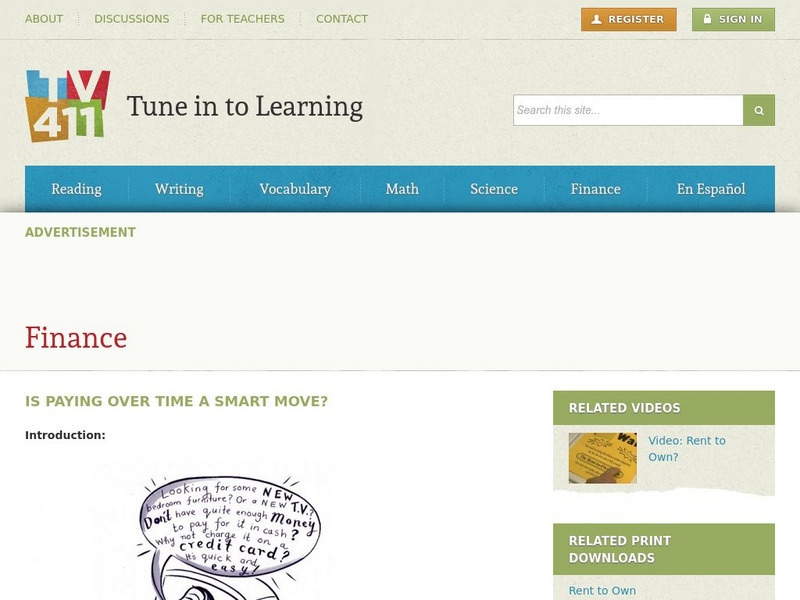Curated OER
What Can You Do With Money?
Students watch a Biz Kidz video about money, learn what they can do with money, and fill out worksheets on what they learn. Students learn about spending, saving, donating, and investing.
Curated OER
A Family Spending Plan
Students investigate family expenditures. In this family budget instructional activity, students examine the wages and expenditures of family and then create a monthly budget for the family to follow.
Curated OER
How You Use Credit Cards Should Determine How You Choose Them
Pupils explore the concept of credit cards. In this credit cards lesson, students read an article about credit card spending. Pupils discuss different ways in which people use credit cards. Students determine what kind of spender they...
Curated OER
Spending
Students participate in a lesson plan that illustrates the concept of spending and how it effects the economy. Technology is integrated in this study with the use of a computer simulation of a pinball game that shows how fast money can...
Curated OER
Month 2 Budget
In this consumer mathematics learning exercise, students complete a monthly budget by completing each category on the sheet. They fill in the blanks and calculate their totals for month two.
Curated OER
Month 3 Budget
In this consumer mathematics worksheet, students complete a monthly budget form by filling each of the categories. They fill in their total expenses for each category and calculate their budget for month three.
Curated OER
Month 5 Budget
For this consumer mathematics worksheet, students complete the following statements with their appropriate information. Then they calculate their total expenses and subtract a portion for savings.
Curated OER
Month 6 Budget
In this consumer mathematics worksheet, students complete each statement with their appropriate information. Then they calculate their total expenses for month six and subtract a portion for savings.
Curated OER
Spending=Q X P Module
Students view a series of of short animated modules to relate the total spending in the economy to production and prices. They use this information to simulate the economy of a town called Spendsville. In the simulation, they apply the...
Curated OER
Getting Green for Christmas
Students examine their family's particular spending habits for a holiday they celebrate, research the financial expectations of retailers during the holiday season and at other times during the year.
University of Illinois
University of Illinois Extension: Plan Your Spending
This site presents the budgeting process through a series of steps. This first page describes the first step, creating a spending plan of estimated expenses. This page also has a link to a downloadable spending plan that requires Acrobat...
Practical Money Skills
Practical Money Skills: Lesson One: Making Spending Decisions
The goal of this lesson is to introduce structured spending decisions to assist young children in making choices and to recognize that money comes in limited amounts.
Other
Credit Reports
This site explains credit reports, credit bureaus, denial of credit, credit counseling, credit fraud and protection, improving credit, and filing for bankruptcy.
Education Development Center
Tune in to Learning: Is Paying Over Time a Smart Move?
At T.V. 411 you can explore the concept of paying over time with situations involving credit cards, rent to own items, and more. This interactive lesson gives the learner an opportunity to make decisions about money management.
Consumer Financial Protection Bureau
Consumer Financial Protection Bureau: Understanding Prepaid Cards
Students play a game and answer questions to learn about prepaid cards and explore whether they'd consider using them.
Consumer Financial Protection Bureau
Consumer Financial Protection Bureau: Creating a Buying Plan
Students practice creating a buying plan and apply this strategy to provide buying advice to others.
Consumer Financial Protection Bureau
Consumer Financial Protection Bureau: Reflecting on Needs Versus Wants
By thinking about their own expenses, students explore how differentiating between needs and wants can inform daily financial decisions and rules to live by.














